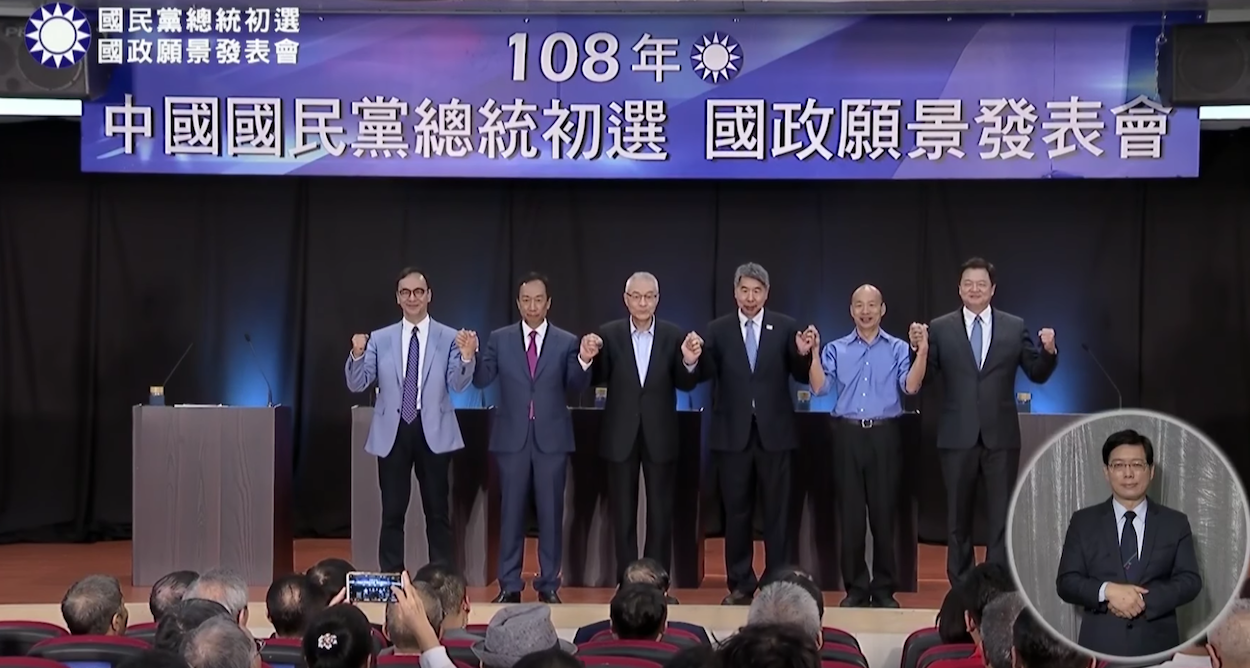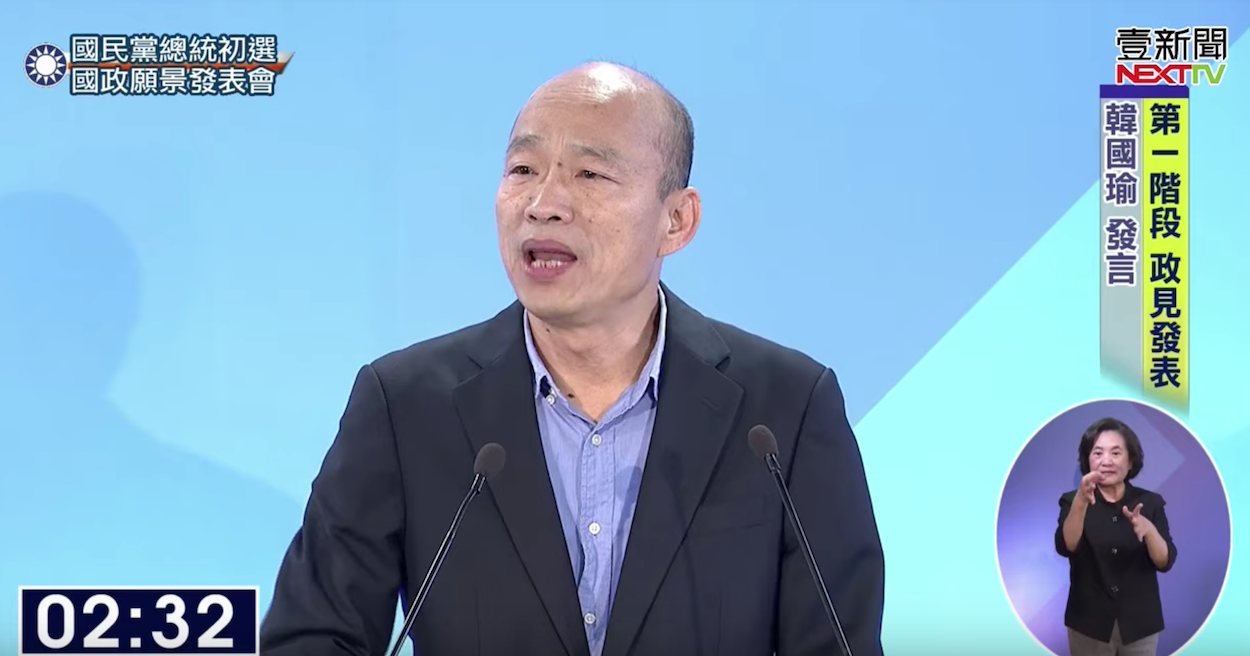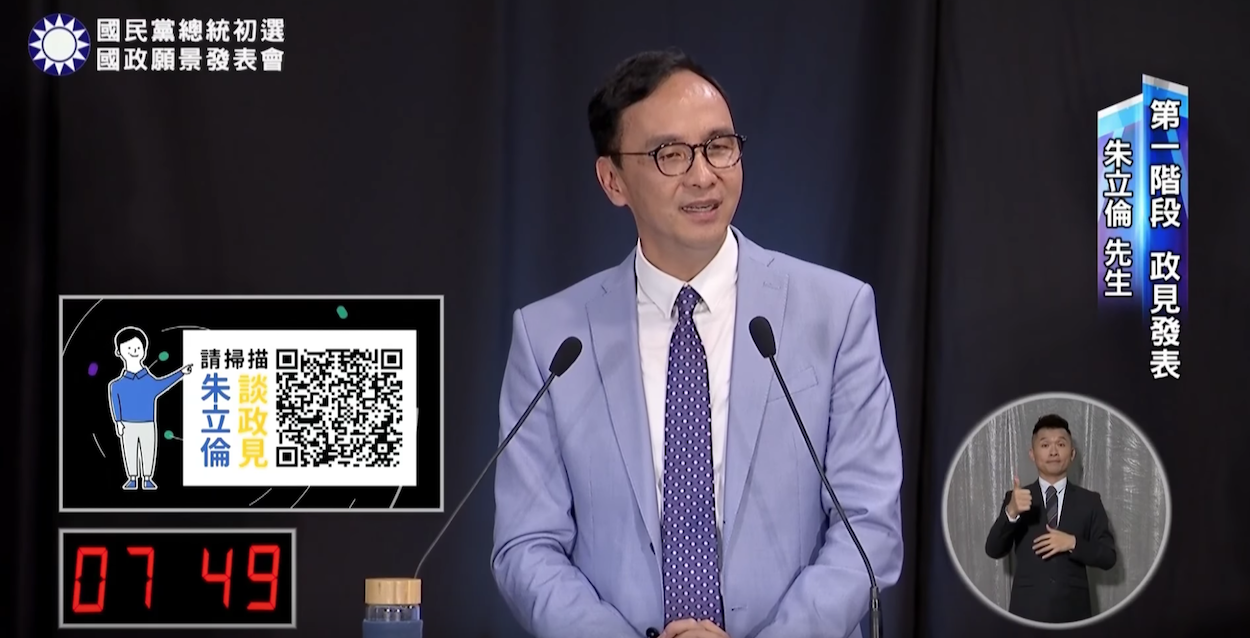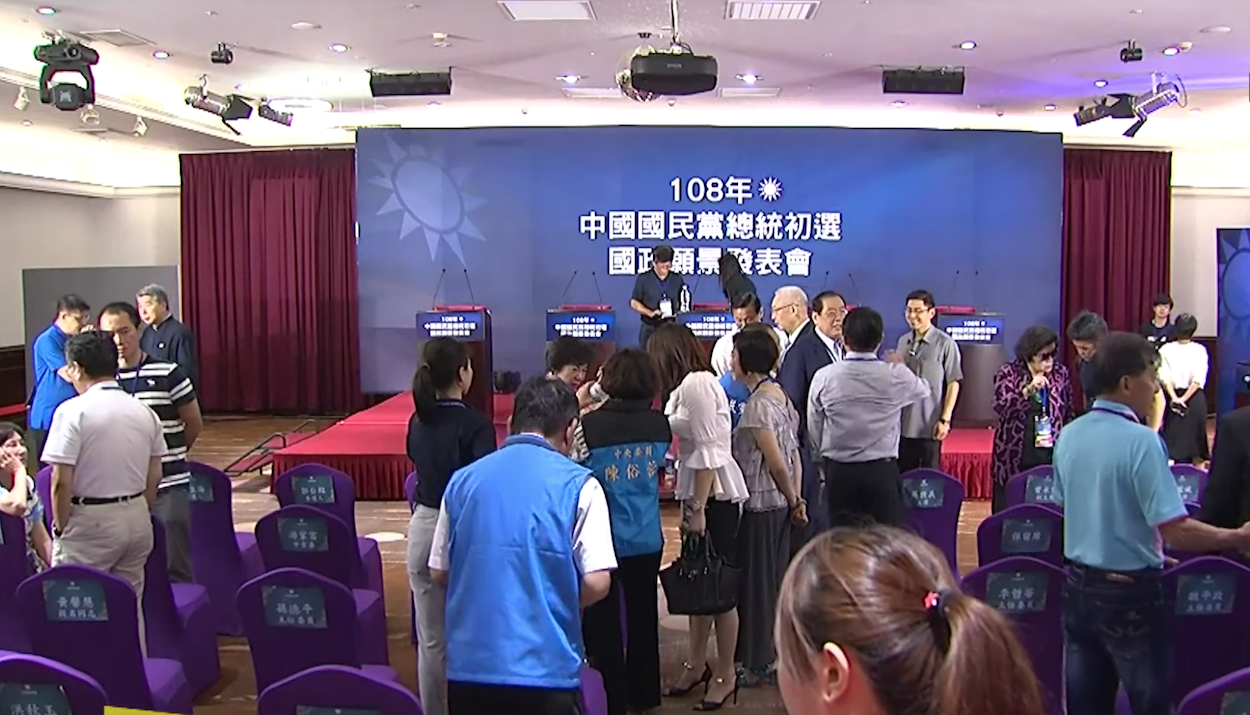by Brian Hioe
語言:
English
Photo Credit: Next TV/YouTube
THREE KMT PRESIDENTIAL primary debates have been held in the past two months. Three sessions were held, each lasting two hours, in order to have one debate held in northern Taiwan, one in central Taiwan, and one in southern Taiwan. The first debate was held on June 25th in Kaohsiung, the second debate on June 29th in Taichung, and the last debate held on July 3rd in Taipei.
The debate format entailed twelve-minute opening statements from each candidate, following which candidates were asked randomly-chosen questions which they each had three minutes to respond to. Two questions were asked during each debate. However, given the lack of any scheduled time for candidates to question each other, the Q-and-A section was sometimes ignored by KMT candidates in order to attack each other. For brevity’s sake, we will focus on the three KMT candidates who are not fringe candidates in the following report: Han Kuo-yu, Terry Gou, and Eric Chu.
 KMT presidential primary candidates posing for photos during the first debate. Photo credit: SETN/YouTube
KMT presidential primary candidates posing for photos during the first debate. Photo credit: SETN/YouTube
In the first debate, Han Kuo-yu, the first of the three major KMT candidates to speak, stood out by raising a number of unusual ideas, including that as president, he would continue to work part of the week in Kaohsiung in order to fulfill his obligations to the city—an idea he has raised in the past. Han also claimed that, in its economic policy, the DPP was too focused on building international links whereas he would focus on Taiwan’s domestic economy and domestic manufacturing.
Paradoxically enough, Han raised current demonstrations in Hong Kong against a Beijing-backed extradition bill in relation to what he claimed to be failures of the DPP’s cross-strait policy. Han stated that, unlike the DPP, he would stick to the ROC constitution and that, as matters of independence and unification could not be decided with the current generation, he would simply leave the issue for the next generation and just attempt to maintain the existence of the ROC, aspiring for peace and stability.
Gou, on the other hand, primarily emphasized his economic credentials as the CEO of FoxConn in his opening remarks. Gou stated that he decided to run for the sake of Taiwan, not for personal interest, and emphasized that he was born and raised in Taiwan. Gou stated that he decided to run for the sake of those not as fortunate as him and that he hoped to create a future for young people, emphasizing a view that Taiwan was a place with great potential, but simply lacked a good leader, and that what Taiwan needed to improve on most was economic development.
Regarding cross-strait policy, Gou would also flag the issue of Hong Kong. Gou claimed that, as he and the KMT had never supported One Country, Two Systems, attempts by the DPP to raise the issue of protests in Hong Kong as a way to attack the KMT were simply political mudslinging. Gou stated that he would develop high-tech industries such as AI, improve national defense, and build international friendships for Taiwan, raising that he had worn a cap with a ROC flag into the White House for a meeting with Trump.
Eric Chu began by attacking Gou and Han for cultivating individual support bases not directly rooted in the KMT party organization, suggesting that they had sown the seeds of disunity within the party by doing so. As such, Chu emphasized that whoever of the KMT candidates won, the party as a whole needed to back them. Chu stated that the ROC required the normalization of relations with other countries, as well as stable cross-strait relations and that Taiwan needed to be self-reliant. By this, Chu meant that Taiwan needed to rely on its democracy for self-reliance, to improve national defense, as well as to embrace economic liberalization.
Chu, then, emphasized support for a free and democratic ROC, though emphasizing his resolute opposition towards Taiwanese independence. Chu brought up Hong Kong and stated that Taiwan needed to support Hong Kongers because of shared democratic values. Chu closed by citing Taiwan’s cultural pluralism and speaking in Taiwanese and Hakka.
When the three candidates were asked about questions national defense, Chu stated that Taiwan needed to have equal relations with both the US and China, and cannot over-rely on the US, as Tsai does, while also criticizing Gou for over-reliance on China.
In response, Gou stated that he has always been a ROC patriot, that he has no other citizenship, and that he is not opposed to military purchases from the US, but that Taiwan needs better purchases. Gou stated that in meetings with American president Donald Trump, he had asserted that he was a peacemaker, not a troublemaker.
 Han Kuo-yu during the last presidential primary debate. Photo credit: Next TV
Han Kuo-yu during the last presidential primary debate. Photo credit: Next TV
Han, on the other hand, claimed that Taiwan needed to study why Switzerland was able to fend off Germany and Thailand able to fend off Japan during World War II, and to embrace self-reliance. Han criticized the DPP for stirring up “fear” regarding cross-strait relations in order to score political points, however.
When the three candidates were asked about what they thought the KMT should do in response to the “unconstitutional” actions of the DPP, Gou, who was first to respond, avoided the question and returned to emphasizing his view that Taiwan was caught between America and China but simply lacked a good leader.
Han stated that president Tsai Ing-wen had overstepped the bounds of authority in taking up powers which should be reserved for the Judicial Yuan and Legislative Yuan in the services of a pro-independence agenda which he claimed few in Taiwan would actually support. Han stated that residents of Taiwan are Taiwanese, since they were born in Taiwan, and to this end, they must support the ROC.
Chu also avoided the question, agreeing that Tsai had overstepped her bounds, but instead using his response time to emphasize the need to promote the voting ability of young people. Chu also pointed out that while polling had previously shown that Gou, Chu, and Han alike would have all been able to beat Tsai, more recent polling showed that either of the three would now lose to Tsai. For Chu, this was another sign that what the KMT needs above all else in the present is party unity.
In the second debate, Eric Chu opened first, by bringing up his two children and stating that through his children, he was aware of the poor economic conditions facing young people. Apart from suggesting that Tsai had appropriated his proposed policies toward young people during the last presidential election when Chu was the KMT’s presidential candidate, Chu suggested that cheap public housing for young people was needed.
Chu stated that in considerations of economic policy, it needed to be kept in mind that many companies in Taiwan are small-to-medium-sized enterprises and that because money made by bosses did not trickle down to the hands of average workers, taxes needed to be raised. Chu stated that vocational education had been a major factor behind the Taiwanese economic miracle, but that this element of Taiwanese education had become neglected. Chu stated that he hoped to improve local schools’ quality of education, so children would not have to travel far from home for a good education, and that he intended to push for local, neighborhood services such as free glasses for the vision-impaired elderly or free meals for needy children.
Gou opened by again stating that he is a man of the ROC and the ROC now faced financial issues regarding pensions, retirement funds, and etc. Gou stated that improving the economy would resolve these issues and that he would stand up for the interests of workers and everyday people. Gou claimed that he had begun working in small-to-medium-sized enterprises and that he understood the land and electricity needs of such enterprises; so he would work with local governments to address issues facing small-to-medium-sized enterprises.
 Eric Chu during the first presidential primary debate. Photo credit: SET/YouTube
Eric Chu during the first presidential primary debate. Photo credit: SET/YouTube
Gou, too, brought up the conditions facing young people. Gou stated that he hoped to give young people opportunities and to promote educational opportunities. Bringing up that many young people are not having children because of being unable to afford to raise children, Gou made the somewhat outlandish claim that he would provide for the care of all children up to six years old. Gou also stated that he would develop AI technology to preserve traditional culture, bringing out a voice-controlled budaixi puppet from behind the podium as he did so to laughter from the crowd.
Han began his comments by emphasizing his military background, stating that he had been weak and fearful as a person before he entered the military due to the draft, but that now he feared for the fate of the nation. Han, like the others, agreed that young people faced harsh living conditions, and also agreed on the need for education. Han stated that the DPP, however, had invested too many resources into teaching Taiwanese, Hakka, indigenous languages, and Southeast Asian languages. Though Han claimed that he saw Taiwan’s plurality as a strength, he said resources should be committed to other things instead.
Han then attacked the DPP for hurting Taiwan’s democracy and failing to address issues regarding drug use. Han stated that he would establish social centers and fix the pension system to help the elderly.
When the three candidates were asked about labor policy, particularly in the wake of heated protests against the Tsai administration’s changes to the Labor Standards Act in 2017, Han cited his experience as the director of the Taipei Agricultural Products Marketing Corporation (TAPMC), stating he prepared funds for workers to pay for their children’s education, and that the better you treat workers, the harder they will work. As such, Han stated that it was impossible to build a successful economy on exploiting workers.
Gou stated that he understood what it was to be a worker as well as to be a boss, and that he would use his experiences to boost Taiwan’s international competitiveness. Gou stated that FoxConn had been unfairly depicted in international media as a company exploitative of its poorly paid workers when in reality it was a high-tech company and stated that he would be more effective than Tsai as president because of his experiences.
Chu also cited his experience working with workers in past government positions and said that Tsai’s mistake with reforms to the Labor Standards Act was that she did not realize that different industries have different working conditions. Chu stated that there was a need to help young people get jobs, again raising his claim that Tsai had co-opted his proposed policies, and said that as New Taipei mayor, he had publicized a list of factories which treated their workers well versus those that did not in order to force improvements in labor conditions.
When the three candidates were asked about how they viewed Taiwan’s needs to retain attachments to traditional Chinese culture, in light of what was phrased as the Tsai administration’s attempt to use transitional justice efforts as a means of cutting Taiwan off from traditional culture, Han stated that he had already said enough on the matter regarding his rejection of learning Taiwanese, Hakka, indigenous languages, and Southeast Asian languages, instead using his time to reemphasize the need to fight drug usage in Taiwanese society. According to Han, drugs had harmed the ROC since the Opium War.
 Terry Gou during the first presidential primary debate. Photo credit: SET/YouTube
Terry Gou during the first presidential primary debate. Photo credit: SET/YouTube
Gou brought up the sea goddess Mazu, who Gou famously claimed had come to him in a dream and told him to run for president, and stated that the contradictions of Tsai’s tourist policy are visible in that Tsai promotes Mazu, but Mazu is originally from China. Gou stated that Tsai would drive away Chinese tourists through pursuing cultural and political Taiwanese independence, and said that he promoted the merging of indigenous culture with Chinese culture, stating that what he promoted is “cultural harmony, while what Tsai promotes is Cultural Revolution.”
In his response, Chu raised the issue of what the Taiwanese version of Chinese culture was. Chu brought up the example of the National Palace Museum, suggesting that while Taiwan has the ‘contents” of the Forbidden City, China simply has an empty building. This, for Chu, was emblematic of how Taiwan preserves the traditional Chinese culture that China has lost, as also observed in Taiwan’s continued use of traditional Chinese characters. In incorporating indigenous and southeast Asian culture into Chinese culture, Taiwan has assimilated new, beneficial cultural aspects.
In the last debate, candidates primarily summarized their previous positions. Han began by attacking the Tsai administration regarding what he claimed were its attacks on democracy as well as intellectual culture as a whole, as observed in the controversy regarding NTU’s choice of school president. That being said, Han then emphasized that he was not a traditional intellectual, stated that he would not abandon the south if president of Taiwan, that he would provide for the elderly, and raised a past campaign promise that he would expand Kaohsiung International Airport. Han also stated he would sign FTAs with other countries in order to boost Taiwan’s international standing in the world, comparing Taiwan’s lower rate of signing FTAs compared to other Asian countries.
Chu stated that what he advocated above all else was equality and that, as a proponent of economic liberalization, he also favored FTAs and free trade zones. Chu stated that he also supported expanding Kaohsiung Airport and that he anticipated taishang returning to Taiwan in the near future, as a result of which, land and power needs for their factories needed to be met. Chu also referred to the need to keep Taiwan on the cutting edge of technology and stated that Taiwan could bring in tourism through sports.
In his comments, Gou again emphasized his economic credentials and that he was new to politics, but stated that this is what made him most suitable to be president. Gou stated that he would develop new infrastructure projects along the lines of Chiang Ching-kuo’s Ten Major Construction Projects in order to stimulate the economy, that he would develop new industries such as electric vehicles, and that he would sign FTAs with America and other countries. Notably, Gou made a point of name-dropping his “friendship” with international political leaders including American presidents Donald Trump and Bill Clinton, Indonesian president Jokowi, and Indian prime minister Narendra Modi.
When the three candidates were asked about how they would handle taxes and administration, Gou stated that the financial issues faced by the government were rooted in the poor economy, not in administration, and again emphasized his notion of boosting the economy through constructing infrastructure. Chu attacked Gou for his notion that administrative issues were so easily solved and that government funds could be moved around so easily, on the other hand, pointing toward the need to improve economic opportunities for young people. Han primarily did not offer any specific policy, but agreed with the previous two candidates, stated that the government needed to review its past behavior, and to take up land taxation efforts previously abandoned by the DPP.
When the three candidates were asked about energy policy, particularly after the 2018 referendum on the gradual phasing out of nuclear energy, Gou stated that the DPP had been populist on energy policy and stated that he would rely on nuclear power in order to maintain the stable power sources needed for factories. Chu also stated that he would focus on nuclear energy, stating that coal energy is harmful to people, that nuclear energy is green energy, and that the KMT has always stood for nuclear energy and so had a responsibility to continue standing for it. In his response, Han attacked wind energy and solar energy, stating that nuclear energy and coal power are cheaper, and seemed to allege that the DPP’s interest in renewable energy sources such as wind energy and solar energy was the result of corruption and kickbacks from foreign companies.
 The audience during the second presidential primary debate. Photo credit: EBC/YouTube
The audience during the second presidential primary debate. Photo credit: EBC/YouTube
In examination of the three major KMT candidates, one finds that all three broadly agreed on the issues facing Taiwan they needed to address, such as regarding the poor economic conditions facing young people, the declining birthrate and growing elderly population, the need to stimulate Taiwan’s sluggish economy, or to ensure a stable energy supply which would not be polluting of the environment. Stimulating the economy was a particularly pressing matter for all candidates.
To this extent, candidates generally offered similar solutions to these issues. KMT candidates universally advocated signing FTAs to boost trade and advocated nuclear power, for example. KMT candidates also broadly tried to appeal to the same party demographics, such as members of the military, public servants, or the elderly.
Candidates, then, primarily attempted to differentiate themselves from each other on the basis of their personal credentials and background in order to claim that they would be the best choice for Taiwanese president in order to resolve these issues, as observed in Guo touting his business credentials as FoxConn CEO, Han touting his experience as TAPMC CEO, or Chu citing his experience in government as New Taipei mayor. Yet Gou stood out in debates for touting unrealistic ideas at times, such as subsidizing care for children up to the age of six, while Han veered into political incorrectness by attacking multicultural language education. But no clear winner seemed to emerge from the three debates, making it likely that voters will support whoever they were previously inclined to support, and that the debates overall had a negligible effect.
Nevertheless, what is of greater surprise is to what extent Hong Kong came up as an issue in the debates, to what extent KMT candidates sought to direct appeals to young people, and to what extent the KMT attempted to claim credit for past historical accomplishments of the DPP.
Although Hong Kong gradually became less visible as an issue between the first debate and the last debate, the KMT evidently fears that its attempts in past years to facilitate closer relations between Taiwan and China will lead to public blowback against it. This is in light of the deterioration of democratic freedoms in Hong Kong under Chinese rule, which has resulted in intensive protests by Hong Kong residents in past weeks.
KMT candidates have attempted counterintuitively to depict Hong Kong as an example of the possible consequences of the DPP’s cross-strait policies, rather than its own cross-strait policies. It remains to be seen if the Taiwanese public would be willing to accept such mental gymnastics, but to this extent, KMT candidates across the board have attempted to retreat to the position of claiming firm opposition to Taiwanese independence, instead trying to emphasize that the party hopes to maintain the de facto independent existence of the ROC through rejection of the formula of “One Country, Two Systems”. The notion of signing FTAs, which all KMT candidates supported, was phrased as signing FTAs with America or other Asian countries rather than specifically China, something which has provoked blowback in the past, as most dramatically in the 2014 Sunflower Movement. The notion of opening up free economic zones was never phrased as opening up free economic zones for Chinese investment, though attracting Chinese investment would be the likely aim of doing so.
This is quite different than in previous years, in which the KMT has seen periods in which the deep blue wing of the KMT took power and attempted to move the party closer to a political position demanding immediate unification, phrasing this as superseding the 1992 Consensus’ view of “One China, Different Interpretations” with the concept of “One China, Same Interpretation”.
 KMT presidential primary candidates posing for a photo during the second debate. Photo credit: EBC/YouTube
KMT presidential primary candidates posing for a photo during the second debate. Photo credit: EBC/YouTube
Likewise, KMT candidates did not only emphasize the need to enact policies that benefit young people but made many attempts to appeal to Taiwanese identity-conscious young people in their debate. This is probably why Terry Gou brought out a budaixi puppet during the second debate, perhaps hoping to appeal to identity-conscious young people who have sought to call attention to budaixi as a unique Taiwanese art form in need of preservation in recent years. Eric Chu also closed his comments during the second debate by citing the lyrics of a song by popular independent rock band EggPlantEgg, which usually sings in Taiwanese. Chu stated the song to be a favorite of his son’s, saying that he saw the lyrics of the song as expressive of the trials and tribulations faced by young people today.
Lastly, much as with KMT candidates’ counterintuitive attempts to claim that the DPP’s cross-strait policy would result in Taiwan becoming similar to Hong Kong, one notes that KMT candidates broadly sought to co-opt the historical accomplishments of the DPP during references to history in the debate. The DPP was accused of “destroying” or “disrupting” democracy on numerous occasions, even as the KMT was the former authoritarian party which sought at all costs to prevent the transition to democracy during the martial law era. KMT candidates raised the claim that Taiwan is the only “Chinese democracy” numerous times and suggested that Taiwan’s successful democratic transition was, in fact, to be credited to the KMT. It also remains to be seen whether this historical revisionist narrative will, in fact, be accepted by Taiwanese voters.
The winner of the KMT’s presidential primary will be announced on July 15th after phone polling from July 8th to July 14th. Regardless of who the winner is, however, the three KMT presidential debates prove a useful way of intuiting the current political consensus views of the KMT as a whole at present.

